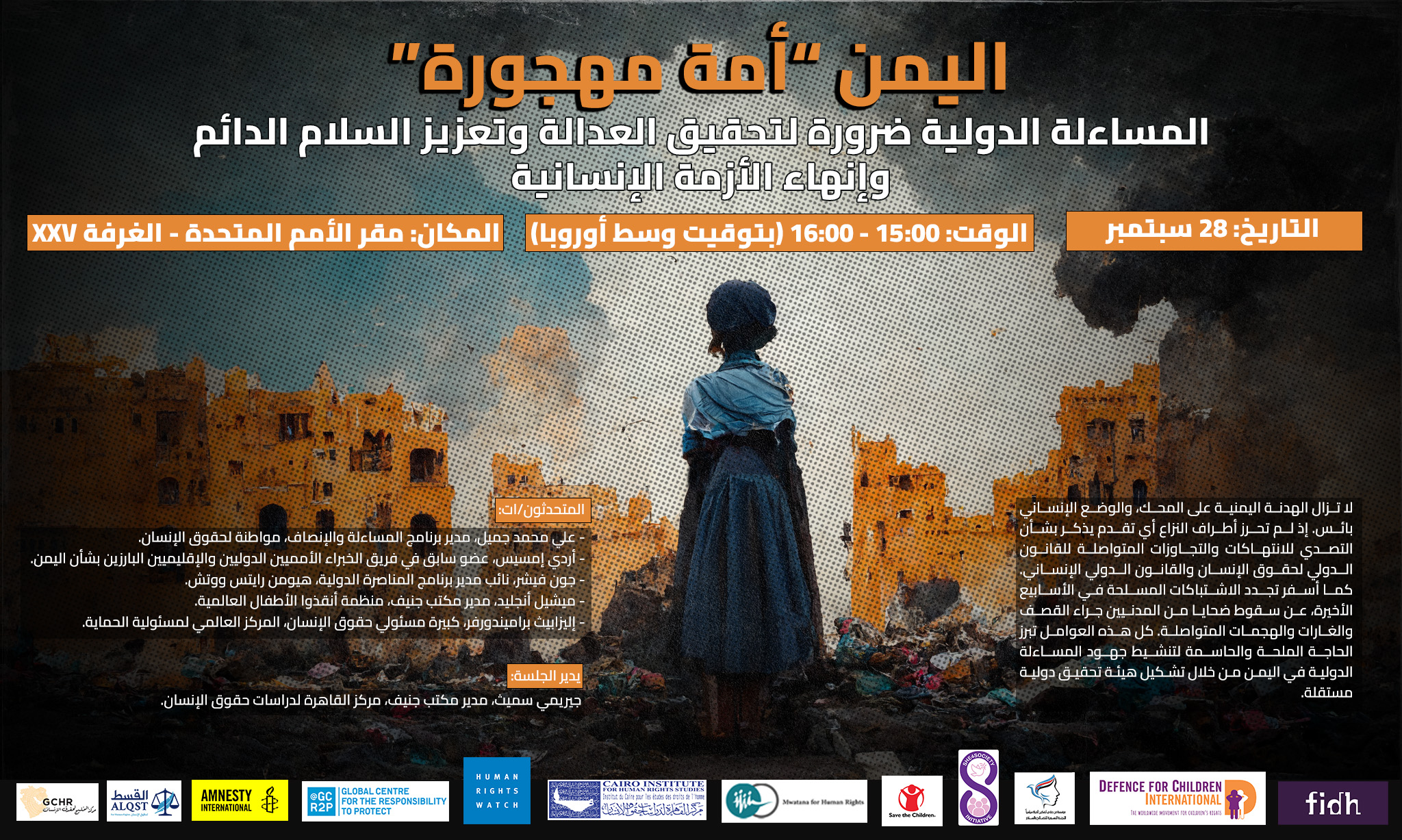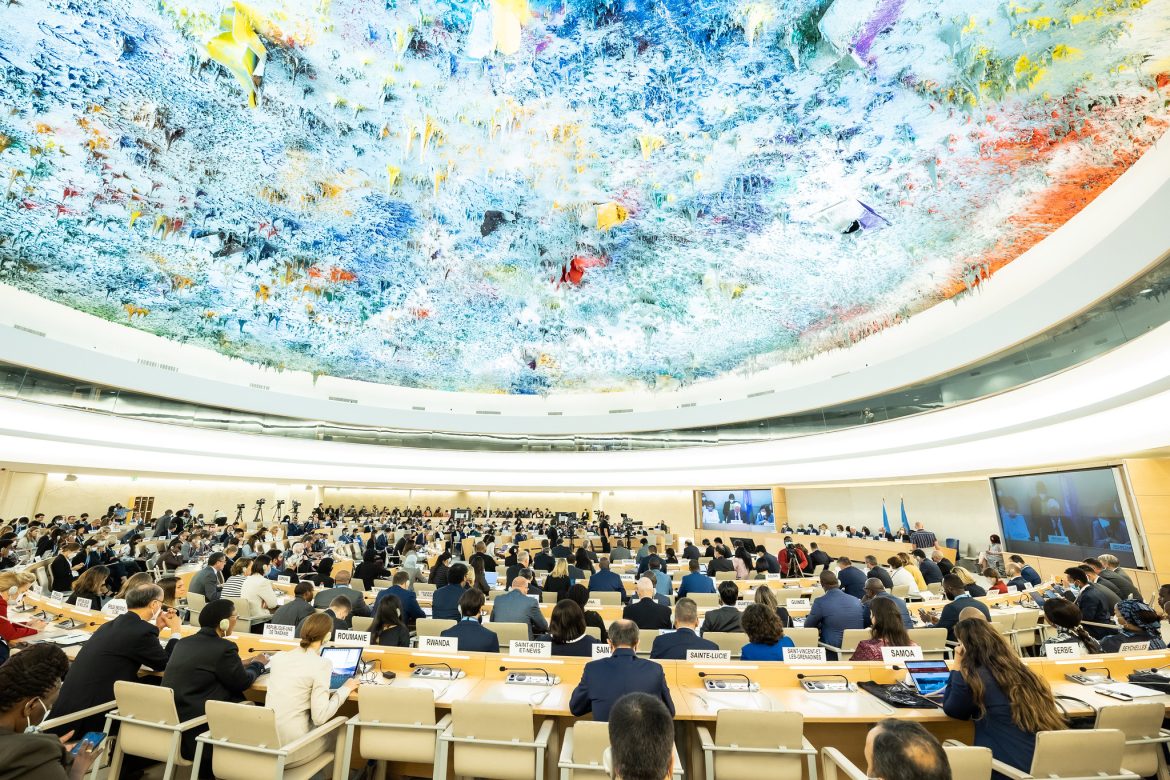الجلسة الـ 51 لمجلس حقوق الإنسان بالأمم المتحدة
السعودية وحلفاؤها ينجحون مجددًا في عرقلة المحاسبة عن جرائم الحرب في اليمن والأمين العام يوصي بآلية للكشف عن مصائر المفقودين في سوريا
اختتم مجلس حقوق الإنسان بالأمم المتحدة في 7 أكتوبر الجاري فعاليات جلسته الـ 51، وفيها رفضت المملكة العربية السعودية وحلفاؤها مقترحات متعددة لضمان بقاء اليمن على جدول أعمال المجلس، وفشلت اليمن في إطلاع المجلس على حالة حقوق الإنسان في البلاد. الأمر الذي كان محل انتقاد 12 منظمة حقوقية في بيان مشترك حول نتائج هذه الجلسة، معتبرين أن تخلي المجلس عن اليمن استجابة للضغوط السياسية لبعض الدول؛ لا يقوض الدور الأساسي للمجلس فحسب، وإنما يشجع أطراف النزاع على الاستمرار في استخدام العنف وجرائم الحرب، طالما ضمنوا أنهم بمعزل عن المساءلة والعقاب.
وكان مركز القاهرة لدراسات حقوق الإنسان قد قدم خلال الجلسة بيان شفهي أمام المجلس، بالتعاون مع مواطنة لحقوق الإنسان، كررا فيه المطلب بضمان تشكيل آلية تحقيق دولية مستقلة عن الجرائم المرتكبة في اليمن، مطالبين مجلس حقوق الإنسان بألا يختار الصمت واسترضاء الأطراف المتحاربة بدلًا من حماية الضحايا.
وفي ندوة عامة نظمها مركز القاهرة بالتعاون مع 11 منظمة حقوقية على هامش فعاليات الجلسة، تحت عنوان «المساءلة الدولية ضرورة لتحقيق العدالة وتعزيز السلام الدائم وإنهاء الأزمة الإنسانية في اليمن» اتفق المشاركون على أهمية الدور الذي كان يؤديه فريق الخبراء الأمميين البارزين بشأن اليمن، وأن قرار المجلس- تحت ضغوط سعودية إماراتية- بإنهاء ولايته العام الماضي، خلف فجوة في التوثيق وإعداد التقارير التي من المفترض تقديمها للأمم المتحدة بشأن اليمن، على نحو يضاعف الحاجة لاستحداث آلية أممية جديدة للوفاء بهذا الدور.


على الجانب الأخر، نجح المجلس خلال هذه الجلسة في تبني قرار بشأن الاحتجاز التعسفي بحق المدافعين عن حقوق الإنسان والصحفيين والمتظاهرين السلميين، يحدد بشكل كامل مسئوليات الدول في هذا الصدد، ويحدد التزاماتها بشأن القضايا المستجدة التي تؤثر بشكل خاص على عمل الصحفيين، بما في ذلك الدعاوى القضائية والهجمات خارج الحدود الإقليمية. وقرار أخر بشأن مكافحة الإرهاب وحقوق الإنسان، يتضمن توصيات واضحة تتعلق بضمان سيادة القانون واحترام حقوق الإنسان في سياق مكافحة الإرهاب، والامتثال للالتزامات الدولية لحقوق الإنسان أثناء عمليات استهداف المشتبه بهم، ونقلهم واحتجازهم، والحق في محاكمة عادلة، والحق في الخصوصية وحرية التعبير، وكل ما يتعلق بحقوق الطفل والمجتمع المدني، وغيرها من الإجراءات القانونية الواجب ضمانها.
وكان مركز القاهرة قد انتقد في بيان شفهي أثناء الجلسة صمت الدول الاعضاء عن الانتهاكات الخطيرة التي ترتكبها السلطات المصرية، بما في ذلك التعذيب والاعتقال التعسفي، بحق الصحفيين والإعلاميين المستقلين والمدافعين عن حقوق الإنسان والنشطاء السياسيين بحجة مكافحة الإرهاب، بينما تستعد مصر لاستضافة قمة المناخ 27 نوفمبر المقبل. كما انضم المركز لبيان مشترك يطالب المجتمع الدولي بضمان حماية المدافعين عن حقوق الإنسان في مصر والجزائر من الممارسات الانتقامية المستمرة بحقهم بسبب عملهم وتعاونهم مع الأمم المتحدة، بما في ذلك الاستهداف والاحتجاز التعسفي والمنع من السفر. وفي بيان أخر أدان المركز تقاعس المجتمع الدولي عن حماية منظمات المجتمع المدني الفلسطيني والعاملين فيها من انتقام السلطات الإسرائيلية، وذلك بعد اقتحام وغلق مكاتب 7 منظمات فلسطينية رائدة، ووصمهم بالإرهاب، وتهديد مديريها والعاملين فيها بالاعتقال، كوسيلة للحد من عملهم في فضح الانتهاكات الإسرائيلية ونظام الفصل العنصري الإسرائيلي.
في هذه الجلسة أيضًا أوصى تقرير الأمين العام للأمم المتحدة بشأن سوريا بتشكيل آلية أممية للكشف عن أماكن ومصائر الأشخاص المفقودين في سوريا، بالتعاون مع الآليات القائمة، على أن تضمن للضحايا والناجين وأسرهم المشاركة بشكل كامل وذو تأثير في كيفية عملها وتفعيل قراراتها. وفيما رحب مركز القاهرة وشركاؤه بتوصيات هذا التقرير فيما يتعلق بالمختفيين، انتقدوا في بيان مشترك إجراءات العودة الجبرية للنازحين واللاجئين إلى سوريا، التي تستعد لتنفيذها بعض الدول مثل تركيا، مؤكدين أن الأوضاع في سوريا لا تفي بمتطلبات العودة الآمنة الطوعية في ظل أسوء أزمة اقتصادية وإنسانية تشهدها سوريا منذ بداية الصراع. كما دعا البيان الدول الأعضاء إلى إعادة تقييم تأثير العقوبات على المساعدات الإنسانية المقدمة للشعب السوري.
جدير بالذكر أن الجلسة الـ 51 لمجلس حقوق الإنسان بالأمم المتحدة بدأت فعاليتها بمقر المجلس في جنيف في 12 سبتمبر الماضي وامتدت لثلاثة أسابيع متصلة. وفيها ركز مركز القاهرة لدراسات حقوق الإنسان على التطرق لقضايا حقوق الإنسان في 5 دول (مصر، الجزائر، سوريا، اليمن، فلسطين)، سواء من خلال المداخلات الشفهية أمام المجلس أو المشاركة في فعاليات على هامش الجلسة.
Share this Post

